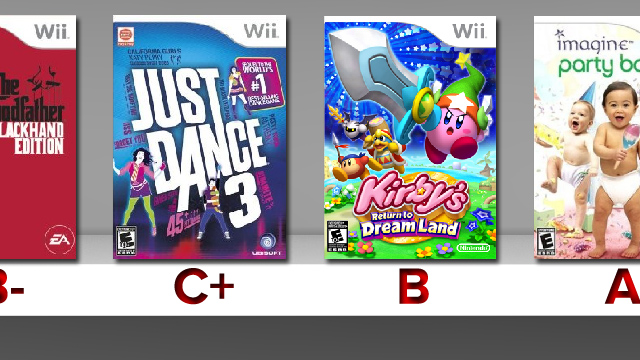 If there’s one thing that endlessly fascinates me, it’s the way that the media can shape people’s minds.
If there’s one thing that endlessly fascinates me, it’s the way that the media can shape people’s minds.
With just a simple piece of information, you can do whatever you want with it. Take it out of context, blow it out of proportion, twist it to your own gain– it’s really just so fascinating to see. However, it also really bothers me too, especially when people get their information from one place and one place only. You may agree with what they say, but isn’t it better to try to round yourself out more and look at all different opinions before shaping your own?
That’s where this latest rant comes into play– should video game review scores matter?
On one hand, there is a need for reviewers. Video games cost a pretty penny and sometimes, you want to make sure you’re going to buy the right thing. After all, if you return it, you may end up only getting a few bucks back. Sometimes, you need to know what you’re going to get yourself into when it comes to video games. Also, God only knows I’ve made a few foolish purchases with some video games due to not trying to pay attention to a review score.
Then again, looking at it from the other side of the coin, there’s a sort of mere sheep-like behavior with some people. You don’t want to have to buy into everything that said reviewers say. Sometimes, you need to play it yourself before you decide if you like it or not. A lot of reviews have said that Kirby Squeak Squad is a pretty crappy game, but I still bought it as a loyal Kirby fan. It was actually pretty enjoyable, though a little on the easy side. Not letting yourself get talked into putting off buying some games can be beneficial as well.
One problem with review scores, in my opinion, is the scoring itself. Rating something on a scale of 1-5 or 1-10 can be very problematic and very controversial if others don’t understand your grading rubric. While an 8.8 may be a damn good score for some of you, to others it means that you’re a nitpicking jerk who hates all things that are great in the world. There’s this weird mantra that anything below 8.0 is complete crap. I have no idea where this came from, but it’s really weird. I mean, a game that’s a 7 is still a good game, right? What needs to be done here is proper explaining of the scoring rubric to your fans and readers. You’ll still get nerdy nitpicking complaints from some, but that’s par for the course.

Exhibit A: Eidos’ not-so-masterwork, according to Jeff Gerstmann.
One other problem that I have is potential conflicts of interest. Now, here, we stick to Nintendo and solely Nintendo. That’s just how we roll here. Sure, sometimes the other systems may come into play, but it’s not super often. However, I assure you that we mostly keep our own reviews as objective as possible and keep in mind everything. As for the sites that go for all different types of games, I remember that those sites are kept alive by good old advertising. The conflict of interest comes around once video game companies start advertising, and through that, there’s some possibility of there being pressures from them to rate their games a little higher since they are helping bring in the bacon for the editors. In fact, this was actually a possible reason for the firing of Jeff Gerstmann in 2007 over at GameSpot. While it was denied by everybody involved, there were thoughts that his firing was due to his low rating of Kane & Lynch: Dead Men, which was produced by Eidos Interactive. Not coincidentally, Eidos put some serious dough in advertising on GameSpot’s website. This, to me, is only one potential danger– and to insinuate that all outlets are biased for those who advertise on their websites would be unfair. Sure, the ethical dilemma is eyebrow raising, but who are we to judge those things?
I could also go on about elitist or extremely subjective gamers who review and seem to dock off points against anything that isn’t something that the public likes, but that’s not fair for me to really get on them about it since I have my own somewhat subjective opinions and I don’t want to be a hypocrite. The point of the matter is that with it comes to review scores, there’s really a lot of factors that can cause so much fervor amongst others and can sometimes make others wonder whether they should matter or not.
When it comes right down to it, it’s really a very light touch. For one thing, you should read reviews for games to get a good gist of what’s going on in them. However, don’t just read one review and go from there. Sometimes reviewers can think a really bad game is good or a really good game is bad. Read more than one review, try to gather the gist of what seems to be good and bad and decide if you want to get it yourself. However, you shouldn’t also decide that just because they say the game is bad that you shouldn’t give it a shot yourself. If you really find yourself interested in the game, then by all means check it out. Your intuition could prove you right after all.




 ShareThis
ShareThis







The problem with reviews is that there is a lot of bias that comes from the reviewer. Reviews are -by nature- subjective. The ability to get really easy low scores or really easy high scores is why I redid the entirety of the review system at dmgice.com
The new review system uses what I call Template 5
http://dmgice.com/revs/reviewtemplate.txt
It’s the most absurd design because it is intended to thwart handing out a perfect score. A perfect score is an S Rank. I do the reviews myself and I honestly find myself docking stars and regretting it. Each star is worth about 3 points. If a game misses ONE star, there is no chance of an S Rank.
I feel that customers read reviews for entertainment and confirmation bias. Developers read reviews for tips on how to make their product better. The reviews are designed for constructive criticism and entertainment.
Check a few of them out at http://www.dmgice.com/revs/
I definitly agree with this article, there are many great games that people just won’t give a shot because they got bad reviews. What it really comes down to is the players opinion I think.
Corporate Use
The purpose of reviews is meant to be for helping readers decide if they would enjoy the games being reviewed. However, companies use review scores to help determine how well received their games were. They listen to the critiques and make adjustment for future releases based on the reviewers’ and readers’ comments. Companies look to sales figures to determine if it is viable to make a sequel, but they look to reviews to determine what content should be in that sequel. And then there’s metacritic. Metacritic is a widely used resource for companies to use in their analysis of how well their games were received, and in determining the worthiness of continuing the series of games. Reviews should be a tool for users, but instead they are more used by companies.